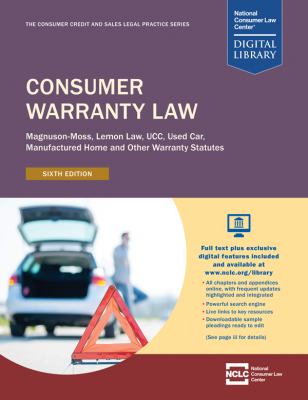On May 28, 2015, the FTC announced new changes to its rules under the Magnuson-Moss Warranty Act that, effective July 20, 2015, will significantly aid private consumer warranty litigation. The details and impact of the new rules are reflected in revised versions of Chapters 2 and 13 of NCLC’s Consumer Warranty Law, now available on-line. Chapter 2 is also fully updated with all the latest Magnuson-Moss cases and developments on all topics. Checking “Highlight Updates” at the top of any page will highlight new developments.
FTC’s actions include:
No mandatory arbitration of consumer warranty disputes. The FTC had previously found that warrantors cannot require that written warranty disputes be sent to binding arbitration. Since that holding, two circuit courts have rejected the FTC’s interpretation. Despite this, the FTC’s new interpretation explicitly rejects the holding of those circuits and continues to find that mandatory binding arbitration is prohibited for written warranty disputes. This thus gives important support to courts to disagree with those two circuit court decisions. See NCLC’s Consumer Warranty Law § 13.4.6 (online version). Note also that new CFPB Rules limit arbitration in manufactured home sales. See Consumer Warranty Law § 13.4.2a (online version).
Magnuson-Moss protections apply to lease warranties. Most courts have held that the Act applies to consumer leases, but a few have disagreed. The FTC’s rule announcement states its unequivocal view that the Act applies to consumer leases, and specifically identifies the contrary decisions as erroneous. See NCLC’s Consumer Warranty Law § 2.2.6 (online version). This means that consumer lessees can bring suit under the Magnuson-Moss Act for breach of a written or implied warranty in consumer lease transactions, and recover not only their damages but also attorney fees. It also means that the Act’s limits on disclaimers of implied warranties apply to consumer leases.
Magnuson-Moss protections apply to service contracts even when regulated as insurance. The new FTC rule reverses its prior holding and now provides that the Act applies to service contracts regulated as insurance as long as the Act does not impair state insurance law. The Supreme Court has held that merely providing an additional remedy to that provided in insurance law does not impair state insurance law, so that attorney fees are now available for breaches of such service contracts. See NCLC’s Consumer Warranty Law § 2.3.2.2.5 (online version).
Use of Aftermarket or Recycled Parts Not a Basis to Deny Warranty Coverage. It was already clear that a warrantor could not require a consumer paying for parts or labor in warranty repairs to use only authorized service or authorized parts. The FTC’s commentary makes it clear that it is a violation if a warranty would lead a reasonable consumer to believe such service or parts were required. For example, where a warranty covers parts but not labor, the warranty cannot imply that the labor must be performed by an authorized person. Where the consumer must pay for parts, the warranty cannot be voided for use of unauthorized parts. Unfortunately, the new rule continues a pre-existing exception where the warrantor pays for half of both labor and parts. See NCLC’s Consumer Warranty Law § 2.4.1 (online version).
Clarification as to When Service Contract Sale Prevents Disclaimers of Implied Warranties. According to the new rules, if a dealer sells a service contract that obligates the dealer to perform under the contract, the dealer cannot disclaim implied warranties. The rules also say that if a dealer does not offer a written warranty, it can disclaim implied warranties if it “merely” is an agent selling someone else’s service contract. Many dealers though do more than merely act as an agent, so these dealers should not be able to disclaim implied warranties. See NCLC’s Consumer Warranty Law § 2.3.2.2 (online version).


